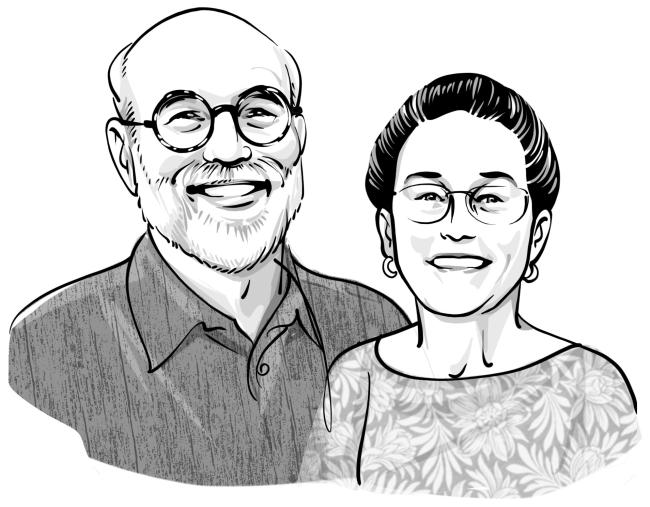Elizabeth Short, MD and Michael Friedman, MD
Elizabeth Short, MD and Michael Friedman, MD were among the earliest supporters of the Yiddish Book Center and have designated a bequest for the Center after they pass.

In the early 1960s, Dr. Elizabeth Short was on a Fulbright program studying art history in Vienna and weaving in Innsbruck, learning the German dialects of those cities. She had no knowledge of Yiddish then, but when she discovered the language it seemed oddly familiar.
“I got immersed in two quite different-sounding Germans,” she recalled from her home in Pasadena, California. “After a year I went to Berlin, traveling through Germany. I asked someone where the ladies’ room was, and I couldn’t understand what she was saying. It was much easier for me to like Yiddish—it had qualities that I was already familiar with from living in Vienna.”
A Boston native, Libby studied philosophy at Mount Holyoke College in South Hadley, Massachusetts, before going on to an accomplished medical career. Since receiving her MD from Yale, she served as the chief resident in medicine at Stanford School of Medicine, a professor and associate dean for education at Stanford, and a member of the White House Taskforce on Health Care Reform, chaired by then First Lady Hillary Clinton.
But her time in Austria, as well as a Mount Holyoke connection, had a lasting impact. It was while attending a class reunion that she met Yiddish Book Center founder Aaron Lansky and formed an immediate friendship.
“I don’t know where we ran into each other—I must have read something and found it fascinating,” she recalled. “I met him while he was still shlepping books, before the Center was built. I thought it was very exciting.”
Libby soon became one of the Center’s early supporters and has remained a member and supporter for more than three decades.
“I think it resonated with me because I was interested in the language,” she added. “I ran into this guy who was very enthusiastic, and we just hit it off.”
When she met her husband, Dr. Michael Friedman, she introduced him to her newfound passion, bringing him to the Yiddish Book Center during another class reunion on the East Coast.
Like Libby, Michael was a successful doctor. A native of Port Arthur, Texas, and a graduate of Tulane University and the University of Texas, Michael has served as a senior executive at Pharmacia Corporation and as chief medical officer for biomedical preparedness for the Pharmaceutical Research and Manufacturers of America. Additionally, Michael has served as deputy commissioner for the U.S. Food and Drug Administration and associate director of the National Cancer Institute and the National Institutes of Health during the Clinton administration. He was also familiar with Yiddish, having grown up hearing it from his grandparents.
“[Libby] has a great ability with languages, I have just the opposite,” he joked. “My ability with languages is probably zero, but for some reason it’s appealing.
“I wouldn’t minimize the mystique of my grandparents and the sheer magic of their conversations, which were both intimate and meant to be very personal,” he added. “It was wonderful hearing the jokes and understanding only some of them. As a kid I remember my grandfather singing ‘Oyfn Pripetshik.’ What’s encompassed in that? It’s family, it’s history, it’s personality, it’s culture in the deepest sense.”
Despite their different paths to Yiddish, and to the Yiddish Book Center, it’s a connection that Libby and Mike both treasure. In addition to their longtime support they have designated a bequest for the Center after they pass—biz hundert un tsvantsik!
“People come to the Yiddish Book Center through many different pathways,” Mike noted. “I think for Libby it was a powerful intellectual draw, and for me it was more of an emotional draw. We’re just two examples. And we think it’s important to support.”
“I love being at the Center, and I loved watching Aaron shlep books back in the old days,” Libby added. “It was romantic and heroic to save an almost-extinct language. I find it a very exciting and heroic thing to do.”
